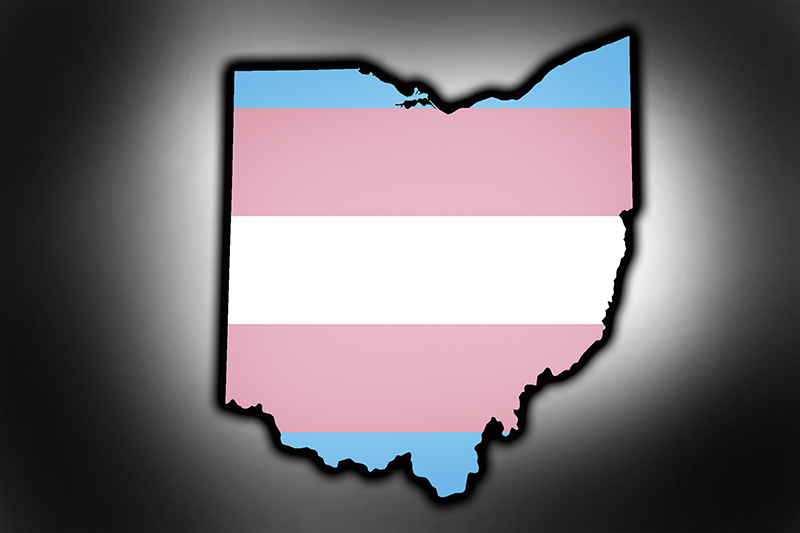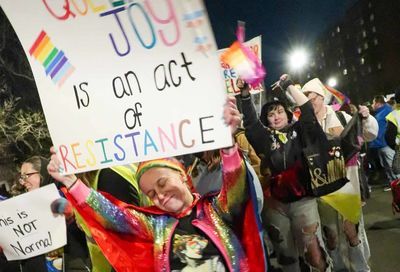Appeals Court Blocks Arkansas’ Ban on Transgender Youth Treatments
Court finds restrictions on access to gender-affirming care discriminate against trans youth on the basis of their assigned sex at birth.
By John Riley on August 26, 2022 @JRileyMW

A federal appeals court has upheld an order blocking an Arkansas law that sought to bar transgender youth from accessing gender-affirming health care treatments, and penalize doctors who prescribe such interventions.
On Thursday, the 8th U..S. Circuit Court of Appeals upheld a lower court’s injunction blocking the state from enforcing the law after four transgender youths, their parents, and two doctors filed suit, arguing that the ban violates transgender youths’ right to free speech (including self-identification) and equal protection under the law, infringes on their parents’ right to decide what sort of care they receive, and violates physicians’ free speech rights by preventing them from recommending the treatments that are best for their patients.
In its ruling, the appeals court found that, “[b]ecause the minor’s sex at birth determines whether or not the minor can receive certain types of medical care under the law,” the ban discriminates on the basis of sex. As such, the law will continue to be blocked while case is decided on its merits.
The lower court judge who issued the injunction last year, U.S. District Judge James Moody, Jr., of the Eastern District of Arkansas, is slated to hear oral arguments on October 17 on whether the law should be permanently blocked, reports Politico.
The law, passed on largely party-line votes in the Republican-led state House and Senate, was initially vetoed by Gov. Asa Hutchinson last year over concerns that the law — which also allows health insurers to deny coverage for any transition-related care, even for adults — was overly broad, infringed on parental rights, and failed to exempt youth who were already receiving care, further disrupting their treatments. But Republicans overrode Hutchinson’s veto, prompting the plaintiffs to sue. Seven days before the law was slated to go into effect, Moody issued his injunction preventing the law from being enacted.
Multiple medical groups, including the American Medical Association, oppose the ban and have argued that transition-related treatments can be safely administered. LGBTQ advocates and civil rights advocates noted that, in addition to potentially being unconstitutional, the law would harm transgender youth, potentially exacerbating their gender dysphoria and leading to depression, anxiety, and suicidal ideation.
But Arkansas Attorney General Leslie Rutledge, arguing on behalf of the state and the state medical board, argued that the state has the authority to regulate medical practices, especially those that could be potentially harmful. Rutledge also argued that the restriction on transgender health care is needed to protect transgender youth from making rushed or uninformed decisions about their health that they may later regret if they choose to pursue “irreversible” hormone therapy or surgery.
LGBTQ advocates celebrated the 8th Circuit’s decision, hailing it as a victory not only for the plaintiffs, but all transgender youth.
“Today, the 8th Circuit Court of Appeals affirmed that no child should be denied medical care they need,” Holly Dickson, the executive director of the ACLU of Arkansas, said in a statement. “We are relieved for trans youth. Research shows that denying gender-affirming care to transgender youth contributes to depression, isolation, eating disorders, self-harm, and suicide. Transgender people deserve the right to live healthy lives without fear and discrimination. It’s time for the Arkansas Legislature to protect trans kids, not target them.”
“This is a critical victory for transgender adolescents in Arkansas, their families, and their medical providers,” Chase Strangio, the deputy director for Transgender Justice at the ACLU’s LGBTQ & HIV Project, said in a statement. “The 8th Circuit was abundantly clear that the state’s ban on care does not advance any important governmental interest and the state’s defense of the law is lacking in legal or evidentiary support. The state has no business categorically singling out this care for prohibition. We know adolescents thrive with this care, support, and love, and we’re determined to keep fighting until this baseless law is permanently struck down.”
Similar laws seeking to restrict access to gender-affirming care by youth have passed in Tennessee and Alabama, although the Movement Advancement Project, a pro-LGBTQ think tank, has noted that the specific language in Tennessee’s law — which bans hormone therapy for “prepubertal minors” — is based on a flawed understanding of transgender health care, and may allow minors who have already started puberty (as standards of care generally recommend) to begin receiving hormone therapy. The Alabama law has since been blocked from being enforced by a federal judge.
The state of Arizona passed a similar law that only restricts surgical interventions for transgender youth, but does not ban hormones or puberty blockers. Meanwhile, the state of Texas has encouraged state agencies to investigate families with transgender youth for “child abuse” if their children access gender-affirming care. While courts have allowed investigations to resume in general, two separate injunctions have been issued blocking state agencies from going after specific families who claimed they were targeted by the Texas Department of Family and Protective Services.
Ohio Ban on Trans Youth Treatments Blocked by Court
An Ohio appeals court has prohibited the state from enforcing its ban on medical care for trans youth, declaring it unconstitutional.
By John Riley on March 22, 2025 @JRileyMW
An Ohio law prohibiting transgender youth from accessing gender-affirming care has been declared unconstitutional by a state appeals court. The court has permanently blocked officials from enforcing the ban.
On March 18, a three-judge panel of the state's 10th District Court of Appeals overturned a lower court's ruling that allowed the state to enforce the ban, reported NBC News.
The ban on gender-affirming care -- which passed along with a ban on transgender women and girls from participating on female-designated sports teams -- was passed in late 2023 but was later vetoed by Republican Gov. Mike DeWine.
Trump Viciously Attacks Trans Community in Congress Speech
President Trump called transgender identity a "big lie" and flaunted his orders restricting trans health care and sports participation.
By John Riley on March 5, 2025 @JRileyMW
President Donald Trump used his address to Congress on Tuesday, March 4, to attack transgender individuals, calling transgender identity a "lie" and railing against transgender athletes, gender-affirming care, and trans visibility in the military and more broadly within society.
At one point during the speech, Trump switched from speaking about a child who was diagnosed with cancer to claim his administration was protecting children from "toxic ideologies" in schools.
He brought up the story of January Littlejohn, a Florida anti-transgender activist who sued the Leon County School District in Tallahassee, Flordia, in 2021, alleging that her child's school had discussed restrooms and name change requests with the child, assisting her in "socially transitioning" without informing Littlejohn or her husband of their efforts.
Sarah McBride Urges Dems to Embrace Dialogue on Trans Rights
Transgender congresswoman's comments highlight how Democrats are navigating how to respond to anti-trans political attacks.
By John Riley on March 24, 2025 @JRileyMW
U.S. Rep. Sarah McBride (D-Del.), the first openly transgender person ever elected to Congress, has reportedly cautioned Democrats about the need to foster conversations when it comes to engaging with those who have reservations about certain issues like transgender participation in sports.
"We have to create more space in our tent," McBride told NOTUS about how Democrats should approach people with reservations or genuine questions about transgender inclusion. "If, for instance, we want to have a majoritarian coalition -- not just electorally, but specifically on issues around trans rights -- that, by necessity, is going to have to include people who have a range of thoughts.
Support Metro Weekly’s Journalism
These are challenging times for news organizations. And yet it’s crucial we stay active and provide vital resources and information to both our local readers and the world. So won’t you please take a moment and consider supporting Metro Weekly with a membership? For as little as $5 a month, you can help ensure Metro Weekly magazine and MetroWeekly.com remain free, viable resources as we provide the best, most diverse, culturally-resonant LGBTQ coverage in both the D.C. region and around the world. Memberships come with exclusive perks and discounts, your own personal digital delivery of each week’s magazine (and an archive), access to our Member's Lounge when it launches this fall, and exclusive members-only items like Metro Weekly Membership Mugs and Tote Bags! Check out all our membership levels here and please join us today!
The Magazine
-
Most Popular
 'Porn Star University' Started by Gay-for-Pay Creator Andy Lee
'Porn Star University' Started by Gay-for-Pay Creator Andy Lee  Bea Arthur's Air Force Bio Purged by Department of Defense
Bea Arthur's Air Force Bio Purged by Department of Defense  Gay Porn Star Tim Kruger Dead at 44
Gay Porn Star Tim Kruger Dead at 44  Dance: Spring Arts Preview 2025
Dance: Spring Arts Preview 2025  Gay Nightclub Bans All MAGA-Related Attire
Gay Nightclub Bans All MAGA-Related Attire  Trump's FDA Cracks Down on "Poppers"
Trump's FDA Cracks Down on "Poppers"  Transgender Rights Rally at Dupont Circle on March 31
Transgender Rights Rally at Dupont Circle on March 31  Hairdressers Could Be Sued Under This Anti-Transgender Bill
Hairdressers Could Be Sued Under This Anti-Transgender Bill  Ketamine Confirmed as The Vivienne's Cause of Death
Ketamine Confirmed as The Vivienne's Cause of Death  Sarah McBride Urges Dems to Embrace Dialogue on Trans Rights
Sarah McBride Urges Dems to Embrace Dialogue on Trans Rights
 Dance: Spring Arts Preview 2025
Dance: Spring Arts Preview 2025  Transgender Rights Rally at Dupont Circle on March 31
Transgender Rights Rally at Dupont Circle on March 31  Synetic Works its Magic on Charlie Chaplin in 'The Immigrant'
Synetic Works its Magic on Charlie Chaplin in 'The Immigrant'  The Wonderful 'Your Name Means Dream' Finds Heart in AI
The Wonderful 'Your Name Means Dream' Finds Heart in AI  Gallery: The Fantastical Creations of Kitt Lauro
Gallery: The Fantastical Creations of Kitt Lauro  Female Runners Must Submit to Genetic Testing
Female Runners Must Submit to Genetic Testing  Bea Arthur's Air Force Bio Purged by Department of Defense
Bea Arthur's Air Force Bio Purged by Department of Defense  Trump Administration Kills LGBTQ Health Studies
Trump Administration Kills LGBTQ Health Studies  'Porn Star University' Started by Gay-for-Pay Creator Andy Lee
'Porn Star University' Started by Gay-for-Pay Creator Andy Lee  Hairdressers Could Be Sued Under This Anti-Transgender Bill
Hairdressers Could Be Sued Under This Anti-Transgender Bill
Scene
Metro Weekly
Washington's LGBTQ Magazine
P.O. Box 11559
Washington, DC 20008 (202) 638-6830
About Us pageFollow Us:
· Facebook
· Twitter
· Flipboard
· YouTube
· Instagram
· RSS News | RSS SceneArchives
Copyright ©2024 Jansi LLC.









You must be logged in to post a comment.